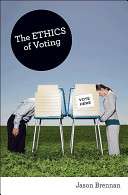The Ethics of Voting
 | |
| Author | Jason Brennan |
|---|---|
| Country | United States |
| Language | English |
| Subject | Political philosophy |
| Publisher | Princeton University Press |
Publication date | 2011 |
| Media type | |
| Pages | 216 |
| ISBN | 978-0691144818 (first edition, Hardcover) |
| OCLC | 679940643 |
| 172.1 | |
| LC Class | JF1001.B742 |
The Ethics of Voting by Jason Brennan is a book which outlines a contrasting argument to the idea that it is the civic duty of individuals within a democracy to vote. The core tenet upon which his argument resides is that the individuals who do not know what they are voting for should not feel the moral obligation to vote on issues about which they are uninformed, and that democracies would benefit as a whole from their abstaining from the polls.[1]
Topics
In addition to the recurring theme that uninformed voting is worse than nonvoting, Brennan discusses the negative effects of voter negligence, or religious motivations for individuals to vote.
Also included is a chapter on the morality of vote buying and why Brennan argues it is justifiable under certain circumstances. And the morality for the "Lesser of two evils" Justification. In the paperback edition there is also an afterword by Brennan titled "How to Vote Well".[2]
Reception
While the book was widely well received as a new way of considering one's civic duty, there have been criticisms of his work. Chad Flanders' review of The Ethics of Voting in the Notre Dame Philosophical Reviews praises the book as a whole but also states that Brennan seems to enjoy being contrarian a little too much. However Flanders admits that the contrarian nature of the writing serves to make the book more entertaining to read.[3]
Ilya Somin, author of Democracy and Political Ignorance, wrote an ultimately positive review of the book for the Volokh Conspiracy but also said that Brennan never states which topics a voter should try to focus on in order to become an "Informed Voter". He also states that Brennan's ideas are not very different from John Stuart Mill’s analysis of the moral duties of voters in his work Considerations on Representative Government.[4] Mill's argument, in section ten of the 1861 essay Considerations on Representative Government, is that an extra set of votes should be apportioned to the highly educated in order that they may ensure the safety and well being of the country.[5]
Bryan Caplan, in an otherwise positive review, criticizes Brennan for not going far enough, saying that Brennan criticizes wrongful voting, but not the right to wrongful voting; i.e. Caplan questions the right of people to vote if they are uninformed.[6]
In addition both Josh Rothman with The Boston Globe[7] and Alan Haworth with The Philosophers' Magazine praised the book for its new take on democratic engagement.[8]
See also
- The Myth of the Rational Voter by Bryan Caplan
- Considerations on Representative Government John Stuart Mill
- The Problem of Political Authority by Michael Huemer
References
- ↑ Brennan, Jason (January 1, 2011). The Ethics of Voting. Princeton University Press. ISBN 9781400842094.
- ↑ "Ethics of Voting". Princeton University Press. Princeton University Press. Retrieved June 15, 2016.
- ↑ Flanders, Chad (December 21, 2011). "Review: The Ethics of Voting". Notre Dame Philosophical Reviews.
- ↑ Somin, Ilya. "Jason Brennan's The Ethics of Voting". The Volokh Conspiracy. The Volokh Conspiracy. Retrieved June 14, 2016.
- ↑ Mill, John Stuart (1861). Representative Government.
- ↑ Caplan, Bryan (July 2016). "Thoughts on Jason Brennan's The Ethics of Voting" (PDF). Reason Papers. 35 (1): 11–16.
- ↑ Rothman, Josh. "Hey, You! - You're Voting Wrong!". The Boston Globe Online. The Boston Globe. Retrieved June 6, 2015.
- ↑ Haworth, Alan. "Get Out the Vote". The Philosophers' Magazine online. The Philosophers' Magazine. Retrieved June 15, 2016.